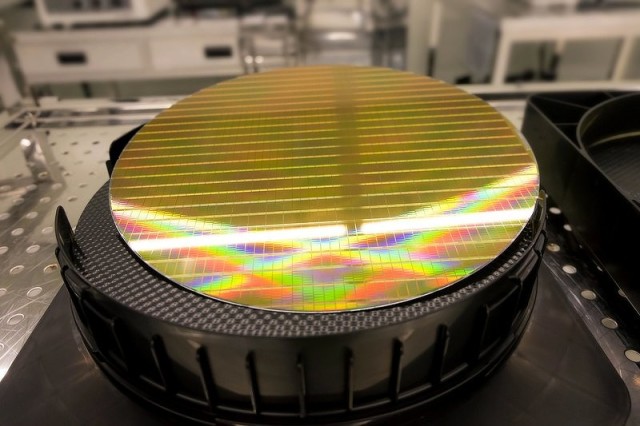GlobalFoundries has signed a contract with the Pentagon to supply several batches of chips for the US Army. Their purpose is unknown, and the first shipment is scheduled for 2023. All chips will be 45-nanometer, although by 2023 the main chip suppliers are going to master the 3-nanometer process.
Advanced country-outdated microchips
The US Department of Defense has signed a contract for the supply of new chips for the needs of the army. This order will be carried out by the American company GlobalFoundries, but modern microchips are not relied on by the military under this agreement.
GlobalFoundries, according to the HPCwire portal, will ship to the Pentagon chips produced according to the 45-nanometer process, which at the time of publication of the material is long outdated. All major manufacturers mastered it back in 2006-2007, when GlobalFoundries itself did not exist yet (it was founded in March 2009 on the basis of the former AMD division). For comparison, Intel's factories can produce 10-nanometer chips, and Korea's Samsung and Taiwan's TSMC are shipping 5-nanometer chips from 2020 and are preparing for an early transition to 3 nm.
Why the US military took the chips are made based on outdated technology, is still unknown. It is only reported that their production will be handled by the Fab 8 factory, GlobalFoundries in Malta – a small town in the state of New York. The shipment of the first batches is scheduled for 2023 – by this time, the main vendors (Intel does not count), according to their roadmaps, will definitely switch to 3 nm.
Support for domestic manufacturers
The new supply agreement with GlobalFoundries builds on a long-standing partnership between the Department of Defense and the company to supply chips for the U.S. defense, aerospace, and other industries. Currently, GlobalFoundries supplies the US Department of Defense with chips produced at its other enterprises: Fab 10 in East Fishkill, New York, and Fab 9 in Burlington, Vermont.
 |
| The Pentagon does not disclose the planned scope of use of obsolete chips |
| Source: CC BY-SA 4.0 / Touch Of Light / |
"GlobalFoundries is an important part of the domestic semiconductor industry, which is a requirement for our national security and economic competitiveness. I have long advocated for it as a key supplier of chips for our army and intelligence, " said Senator Chuck Schumer.
In a supporting statement, the US Department of Defense said: "This agreement with GlobalFoundries is just one step that the Department of Defense is taking to ensure that the United States supports the production of microelectronics necessary for national and economic security. This is a harbinger of the new effort provided for by the recently passed CHIPS for America Act, championed by Senator Schumer, which will support and strengthen the capabilities of US microelectronics."
The factory is old, the requirements are new
Fab 8 was not initially adapted for the production of chips for the military in terms of the level of secrecy. It did not start preparing for this until May 2020, and by the end of 2020, among other things, new regulations began to apply at this plant, brought to compliance with the American "Rules for the International Arms Trade" (ITAR) and "Rules for Export Administration" (EAR).
The Fab 8 plant now employs about 3,000 people. GlobalFoundries has invested more than $13 billion in this venture, and its management recently announced the possibility of purchasing additional land to expand this plant to meet the growing demand for its products from the US government and other customers.
Potential competitors
Factories in the United States for the production of semiconductor products are owned by other companies – for example, the same Intel has 11 American factories. In the foreseeable future, foreign vendors, including TSMC, may also build their factories in the United States.
 |
| The US authorities want to develop semiconductor manufacturing in their country. |
| Source: www.cnews.ru |
As reported by CNews, TSMC in May 2020 expressed its readiness to build the latest 5-nanometer factory on American soil. She was asked to do this during the negotiations by the American authorities, who are seeking to transfer semiconductor production to the borders of their country.
Negotiations with TSMC were conducted by the administration of Donald Trump – the former US president, who left office in January 2021. There was no information about the plans of Joseph Biden (Joseph Biden), who replaced him as head of state, regarding cooperation with TSMC, at the time of publication of the material.
Meanwhile in Russia
The Russian military also buys domestic semiconductor products, which, like the 45-nanometer GlobalFoundries chips, are manufactured according to outdated standards. For example, in late 2018, the Russian defense Ministry has posted a notice on purchase of 500 stations "Elbrus 801-RS option 2" at a starting price of about 410 thousand RUB apiece, and the same stations "Elbrus 801-RS variant 3" with the price of 391 thousand rubles.apiece. These PCs are assembled on the basis of Elbrus-8C processors, produced since 2016 using 28-nanometer technology (the level of 2010). In May 2020, CNews also wrote about the secret purchase of computers on Elbrus by the Ministry of Defense for another 195 million rubles.
Russia also has domestic processors of the Baikal line, which includes, in particular, Baikal-M and Baikal-T1. Both are produced according to 28-nanometer production standards. In October 2020, the Ministry of Internal Affairs of Russia planned to buy 7.77 thousand rubles. PC for 271.9 million rubles with pre-installed OS Astra Linux. The specified parameters of the processors allow the use of "Baikal".

